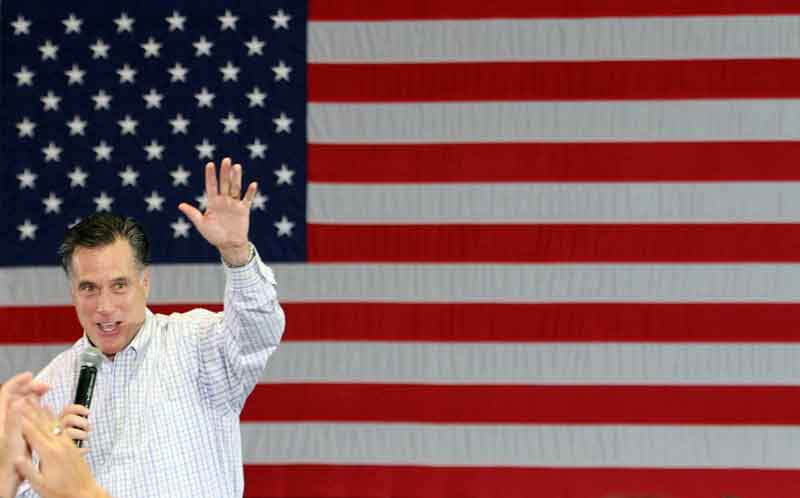For months, you might have guessed that “Mitt” was Mitt Romney’s middle name. His first name seemed to be “putative frontrunner.” Or “nominal frontrunner.” Or “apparent frontrunner.”
We — the media, the general public — just couldn’t bring ourselves to call him simply “Mitt Romney, frontrunner for the Republican presidential nomination,” without some cautious qualifier before his name.
No matter how many polls showed him in first place among the GOP candidates, no matter how many surveys suggested that he would be the strongest challenger to President Barack Obama, we somehow resisted the obvious conclusion that Romney was destined to capture the prize he has sought for so long. We found it difficult to envision his name at the top of the Republican ticket.
No more. With two victories under his belt in as many rounds of actual voting, Romney has convincingly shed all those qualifiers we kept sticking in front of his name.
In fact, heading into Saturday’s South Carolina primary, it looks for all the world as if the most appropriate adjective to place in front of Romney’s name is “inevitable.”
We should have known all along that it would come to this. For all their misgivings about Romney — he’s not conservative enough, he changes his positions on issues too often, he’s a Mormon — Republican voters must have realized that the former Massachusetts governor offers by far the GOP’s best hope to unseat the incumbent Democratic president.
He is the one Republican candidate — the one declared Republican candidate, in any case — who can appeal to independent voters and even Democrats who are disillusioned with Obama. The main thing so many Republicans don’t like about Romney — his past tendency to take moderate-to-liberal positions on social issues and policy matters such as health care — is the very thing that can win him a broad enough base of support to capture the White House in November.
The reluctance of many Republicans to embrace Romney is understandable, if potentially self-defeating. Voters always look for, hope for, a standard-bearer whose views and values are identical to their own, whose public record is consistent and indisputable as an indicator of the principles and policies he or she will purse if elected.
Such candidates, however, rarely emerge. And if even if they do, their performance in office rarely matches expectations. Many Republicans expected George W. Bush to be a more conservative president than he was. Many Democrats thought Obama would advance far more liberal policies than he has.
Not sold on Romney, Republicans elevated successive challengers to positions of prominence only to find them lacking or watch them self-destruct. Michele Bachmann, Rick Perry, Herman Cain, Newt Gingrich all took a run at Romney; all came up short.
Rick Santorum had his day in Iowa and might even make some noise in upcoming primaries. Ron Paul will continue to nip at Romney’s heels, probably all the way to the Republican convention.
Romney has repelled every challenge and gained strength in the process. His strategy from day one was to focus on the task at hand, stay above the fray, let the others have their moment in the spotlight and never, ever let them see him sweat, as some old TV commercial used to say.
The strategy was brilliant. Barring some stunningly unexpected setback, Romney’s campaign is inexorable. His nomination is — dare we say it again? — inevitable.
The only real question now is whether Republicans for whom Romney is not the ideal candidate can squelch their misgivings, swallow their pride and enlist in a unified effort to oust Obama, who at least to some degree owed his victory in 2008 to Republicans’ lack of enthusiasm for nominee John McCain.
Obama’s best chance for re-election might lie in the hands of anti-Romney Republicans who decide to stay home on Election Day or vote for some third- or fourth-party candidate. Ron Paul, perhaps? Donald Trump?
The other side of that coin, of course, is Obama’s need to solidify his base and convince Americans who voted for him last time that whatever their dissatisfaction with him, he is still a better alternative than a GOP candidate who may not be as conservative as Republicans would like him to be but is far more conservative than the president.
It could be a very interesting campaign. And the outcome could be much less predictable than the race for the Republican nomination turned out to be.
Copy the Story LinkSend questions/comments to the editors.



Success. Please wait for the page to reload. If the page does not reload within 5 seconds, please refresh the page.
Enter your email and password to access comments.
Hi, to comment on stories you must . This profile is in addition to your subscription and website login.
Already have a commenting profile? .
Invalid username/password.
Please check your email to confirm and complete your registration.
Only subscribers are eligible to post comments. Please subscribe or login first for digital access. Here’s why.
Use the form below to reset your password. When you've submitted your account email, we will send an email with a reset code.